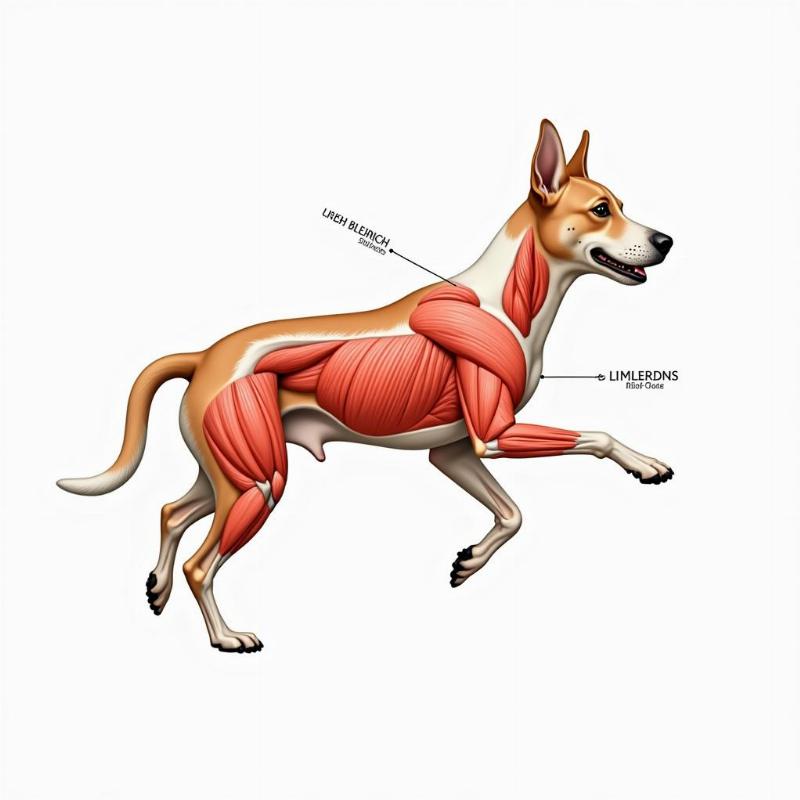Creatine is a popular supplement for athletes looking to enhance muscle strength and performance. But what about our furry friends? Is creatine bad for dogs? The answer isn’t a simple yes or no. While creatine itself isn’t inherently toxic to dogs, its use in canines requires careful consideration. This article will delve into the science behind creatine, its potential benefits and risks for dogs, and provide guidelines for safe usage.
Understanding Creatine and Its Role in Muscle Function
Creatine is a naturally occurring compound found in muscle tissue, primarily responsible for providing energy during short bursts of intense activity. It plays a crucial role in the ATP-PCr energy system, which fuels activities like sprinting and weightlifting. While dogs naturally produce creatine, some pet owners consider supplementing it to improve their dog’s athletic performance.
 Dog Muscle Anatomy Diagram
Dog Muscle Anatomy Diagram
Potential Benefits of Creatine for Dogs
Some studies suggest that creatine supplementation may offer certain benefits for canine athletes, particularly in high-intensity activities like agility and flyball. These potential benefits include:
- Enhanced muscle strength and power: Creatine may help improve a dog’s ability to generate force, potentially leading to improved performance in activities requiring bursts of power.
- Reduced muscle fatigue: By providing readily available energy, creatine may help delay the onset of muscle fatigue, allowing dogs to perform at a higher level for longer periods.
- Improved recovery: Some research indicates that creatine may aid in muscle recovery after intense exercise, reducing muscle soreness and promoting faster healing.
Risks and Side Effects of Creatine in Dogs
While creatine may offer potential benefits, it’s essential to be aware of the potential risks and side effects:
- Gastrointestinal issues: Some dogs may experience digestive upset, including diarrhea and vomiting, when starting creatine supplementation.
- Kidney problems: Although rare, there are concerns about potential long-term effects on kidney function, especially in dogs with pre-existing kidney conditions.
- Dehydration: Creatine can draw water into muscle cells, potentially leading to dehydration if adequate water intake isn’t maintained.
- Lack of regulation: Creatine supplements for dogs aren’t regulated by the FDA, which means quality and purity can vary significantly between brands.
Safe Usage Guidelines and Dosage for Dogs
If you’re considering giving your dog creatine, it’s crucial to consult with your veterinarian first. They can assess your dog’s overall health, evaluate potential risks, and help determine the appropriate dosage, if any.
- Start slowly: Introduce creatine gradually to minimize the risk of digestive upset.
- Ensure adequate hydration: Provide plenty of fresh water to prevent dehydration.
- Monitor for side effects: Watch for any signs of digestive problems, changes in behavior, or other unusual symptoms.
- Choose high-quality supplements: Opt for reputable brands that undergo third-party testing for purity and quality.
Is Creatine Necessary for All Dogs?
The majority of dogs don’t require creatine supplementation. A balanced diet and regular exercise are typically sufficient for maintaining muscle health and function in non-athlete dogs. Creatine should only be considered for healthy canine athletes under the guidance of a veterinarian.
Conclusion
The question of whether creatine is bad for dogs isn’t straightforward. While not inherently toxic, creatine supplementation carries potential risks and should be approached with caution. Consulting with your veterinarian is paramount before administering any supplements to your dog. A balanced diet, regular exercise, and veterinary guidance are the best ways to ensure your dog’s health and well-being. Is creatine necessary for your furry friend? Likely not, unless your dog is a serious athlete.
FAQs
- Can creatine harm my dog’s kidneys? While rare, there are potential concerns about long-term effects on kidney function. Consult your vet.
- What are the signs of creatine overdose in dogs? Signs may include vomiting, diarrhea, and lethargy. Contact your vet immediately if you suspect an overdose.
- Can I give my senior dog creatine? Consult your vet before giving any supplements to senior dogs.
- Are there natural alternatives to creatine for dogs? A balanced diet and regular exercise are generally sufficient for most dogs.
- How much creatine should I give my dog? Consult your vet for dosage recommendations specific to your dog’s breed, size, and activity level.
- Where can I purchase creatine for my dog? Consult your vet for recommendations on reputable brands.
- Is creatine beneficial for puppies? Creatine supplementation is generally not recommended for puppies.
Beautdogs.us is your leading source for expert advice on dog care, breed information, and premium products. Whether you’re a new dog owner or a seasoned enthusiast, Beautdogs.us offers comprehensive, reliable resources to help you navigate the joys and challenges of dog ownership. We provide tailored guidance on everything from nutrition and training to health and wellness. Contact us today to learn more about how we can help you provide the best possible care for your canine companion. Email: [email protected], Phone: +1 501-555-7529 or visit our website at Beautdogs.us.